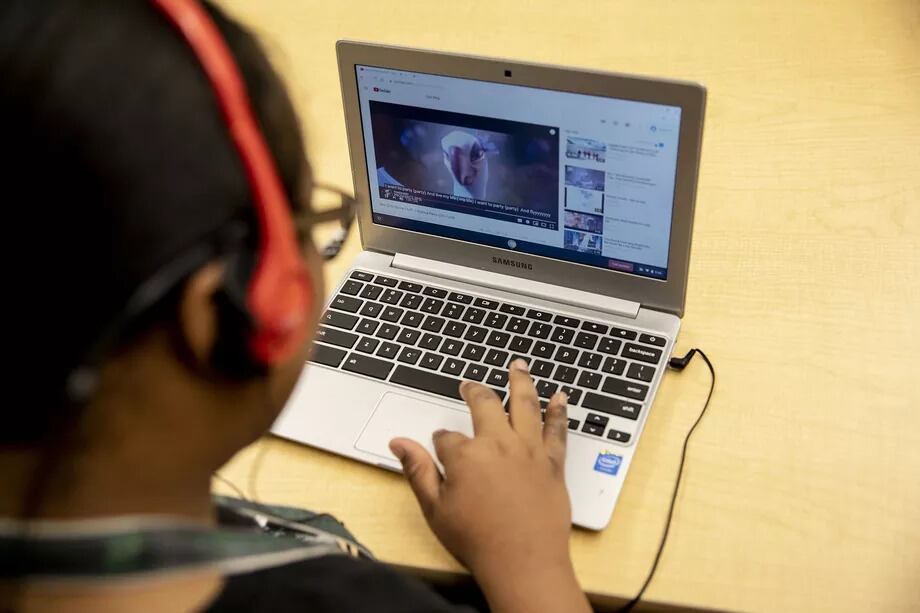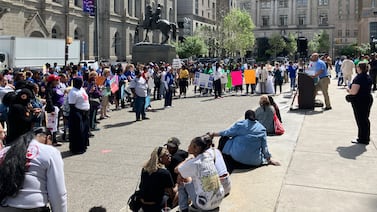This story was originally published on October 29, 2020 by THE CITY.
The head of the city’s child welfare agency called on the state to push reforms to ensure that only reports clearly describing “harm or risk of harm” to a youngster get sent to child abuse and neglect investigators.
The comments, which came at a City Council hearing Wednesday, followed THE CITY’s reports revealing that school parents since April have been subjected to neglect probes simply because they hadn’t received remote-learning devices from the Department of Education.
“If we’re in a home working with a family, and we can help resolve a [technology] problem, we will do that,” Administration for Children’s Services Commissioner David Hansell told the Council’s Committee on General Welfare.
“But we don’t fundamentally think that should be a response assigned to the child welfare system,” he added at the hearing, which tackled racial disparities in the child welfare system.
He urged the state to help stem racial disparities at the source by requiring anti-bias training for so-called mandated reporters — such as educators, social workers and medical staff — and better screening of allegations.
The Office of Children and Family Services officials declined to comment on Hansell’s statements. But as THE CITY recently reported, Commissioner Sheila Poole told advocates in September the state agency is working on “joint guidance” with the state Education Department to address the educational neglect issue.
Hansell touted his office’s early action on instructing investigators to drop probes solely based on a lack of tech.
On Monday, schools Chancellor Richard Carranza declared that “it is not the policy of the DOE to report families to ACS for technology issues.” But at the hearing, advocates argued that guidance is not being followed.
“Teachers in schools are still calling ACS when our clients’ children failed to log on for remote learning,” said attorney Miriam Mack of The Bronx Defenders. “But we know and we’ve seen in the news media that white parents can and do opt out of remote learning without fear of ACS intervention.”
Nathaniel Styer, a Department of Education spokesperson, said in an email Thursday that the agency stresses to staff that access to technology should not be the sole reason for a call to the state child welfare registry.
“Any indication that this guidance is not being followed is concerning and will be taken seriously,” he added.
Hoping for Legislative Change
Wednesday’s hearing examined deep racial disparities in New York City’s child welfare system, where over 41% of cases investigated by child protective services workers in 2019 involved of Black families and over 45% targeted Latino families, according to Hansell’s testimony.
Roughly a quarter of city reports of child neglect and abuse come from schools, according to ACS.
During the nearly five-hour hearing, conducted via Zoom, officials, parents, children and their advocates offered a wide range of potential fixes to a system most agreed was broken and biased. ACS noted that Black children are six times more likely than white children to be named in a neglect or abuse report and 1.6 times more likely than a white or Hispanic child to be placed in foster care if the case is substantiated.
Family rights advocates called on the Council to pass several bills introduced more than a year ago that would require ACS to provide free legal services for parents or guardians, produce multilingual disclosure forms explaining rights and resources, and publish more thorough reports on their records and statistics.
They also pushed for the passage of the Miranda rights-like bill, which has been on hold in Albany since January. The legislation would require ACS workers to read parents their rights before the beginning of the invasive investigation process.
‘Forces of Institutional Racism’
Parents waited long hours to speak near the end of hearing.
One account was given by Taylor Thomas, a Bronx mother who’s partner, Joseph, was separated from their 4-month-old daughter for two months.
Thomas and her partner had brought the infant to the hospital for treatment for a fall from bed, but instead, they “were met with what was a humiliating and criminalizing process when we were then reported to the State Central Registry and accused of child abuse,” she told the committee.
“This experience has driven home for me that despite the love and care Joseph and I have for our daughter, despite our stability of a two-parent household, by our college education and employment, I’m seen primarily as Black and therefore inherently suspect by the child welfare system,” she said.
“Despite our efforts, we are still subject to overwhelming forces of institutional racism,” said Thomas, reflecting on her own investigation by ACS. “This experience has humbled me, and has served as a stark reminder of my Blackness.”






